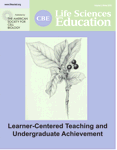Using Critical Literacy to Explore Genetics and its Ethical, Legal, and Social Issues with In-Service Secondary Teachers
Abstract
The described interdisciplinary course helped a mixed population of in-service secondary English and biology teacher-participants increase their genetics content knowledge and awareness of Ethical, Legal, and Social Implications (ELSI) that arose from discoveries and practices associated with the Human Genome Project. This was accomplished by applying a critical literacy approach that allows people develop cognitive skills such that they are able to “read the world” (Wink, 2004). The approach is one that permits readers to go beyond the literal text to examine what is present as well as what is missing as it relates to issues of equity and fairness. Becoming critically literate enabled these teacher-participants to challenge the subtle attitudes, values, and beliefs conveyed by a range of written and oral texts. The teacher-participants in this course improved their critical literacy skills by actively reading, critically writing about, and using evidence to support their conclusions about issues arising from advances in human genetics. A biologist, a linguist, and an educator collaboratively designed and taught the course. The personalized focus on the integration of thoughtful reading and writing in this class enhanced the teacher-participants' (n = 16) professional and intellectual development and will potentially improve learning in their biology and English classrooms in the future.



